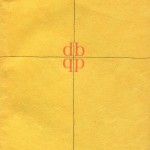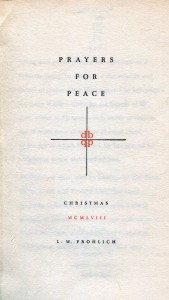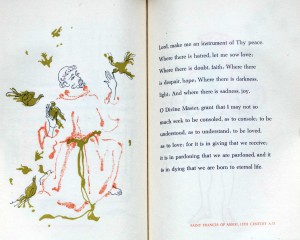Archive for December, 2012
[Posted by Patricia Appelbaum, Ph.D., an independent scholar from Amherst, Massachusetts who is working on a book under contract with the University of North Carolina Press]
 What I found at the Watkinson was a little keepsake book for Christmas, privately printed in letterpress in 1958. I sought it out because it makes reference to St. Francis of Assisi; I’m researching a book about the ways American non-Catholics have appropriated, imagined, and represented St. Francis. This keepsake book is interesting not because it offers any startling new information, but because it confirms some things that we already know or suspect. It’s always striking when large historical patterns are crystallized in an individual, personal statement.
What I found at the Watkinson was a little keepsake book for Christmas, privately printed in letterpress in 1958. I sought it out because it makes reference to St. Francis of Assisi; I’m researching a book about the ways American non-Catholics have appropriated, imagined, and represented St. Francis. This keepsake book is interesting not because it offers any startling new information, but because it confirms some things that we already know or suspect. It’s always striking when large historical patterns are crystallized in an individual, personal statement.
 The editor, offering this booklet to his friends, presents it as collection of prayers for peace from many different times and places. Human beings everywhere, of all colors and creeds, he says, have “prayed for well-being, peace and brotherhood.” He thinks this impulse is especially appropriate at Christmas time, with its message of peace and goodwill.
The editor, offering this booklet to his friends, presents it as collection of prayers for peace from many different times and places. Human beings everywhere, of all colors and creeds, he says, have “prayed for well-being, peace and brotherhood.” He thinks this impulse is especially appropriate at Christmas time, with its message of peace and goodwill.
 The booklet includes the well-known “Prayer of St. Francis,” the one that begins “Lord, make me an instrument of thy peace.” Although St. Francis did not in fact write this prayer, it has been closely associated with him since the early twentieth century, and has been widely used in English since the 1940s. (For a good discussion of its origins, see the articles in Greyfriars Review 10:3, 1996. My book will trace some of its later history.)
The booklet includes the well-known “Prayer of St. Francis,” the one that begins “Lord, make me an instrument of thy peace.” Although St. Francis did not in fact write this prayer, it has been closely associated with him since the early twentieth century, and has been widely used in English since the 1940s. (For a good discussion of its origins, see the articles in Greyfriars Review 10:3, 1996. My book will trace some of its later history.)
St. Francis, then, appears here in a nominally Christian context – Christmas – but also in a multifaith one. The other prayers in the book (if its attributions are correct) are Hindu, Taoist, Jewish, Japanese Buddhist, and Navajo, along with one from the Protestant Martin Luther and another from the Armenian saint Gregory of Narek. This universalistic outlook is one of the surprising paradoxes of 1950s religion. Christianity, in its mainline Protestant form, was generally taken for granted as normative; Protestants were a numerical majority and enjoyed considerable cultural power. Yet there was also a softening
of doctrinal boundaries at that time, both formally, in the ecumenical movement, and informally, in modes of popular religion that cared more about feelings than rules. And a lot of minority faiths were flourishing on the margins. Here is St. Francis in this cultural matrix. (But wait, you say. St. Francis wasn’t a mainline Protestant. True; but by this time he was widely popular among Protestants, unlike most Catholic saints.)
I wonder, though, why the editor chose the theme of peace. 1958 was not a big year for peace movements. Of course the connection with Christmas is obvious (“peace on earth, goodwill to all”). And St. Francis had been associated with peace activism since at least the 1920s. Beyond that, there was a small but growing anti-nuclear movement in the late 1950s.
Still, it would be interesting to know whether the editor had some personal interest or commitment that drew him to this topic.
Finally, I can’t help thinking of another letterpress version of St. Francis. That one, too, was a Christmas keepsake, printed in 1934. Its text was the story of St. Francis and the wolf. Although this is also a sort of peace story, the printer actually chose it because of another wolf – the one at the door of so many people in the Depression era. I’d
like to think that there is some affinity between St. Francis, Christmas, and private presses, but I have to admit that two examples
don’t really add up to a thesis. Still, there they are. Maybe the common ground is that the Christmas season starts people thinking about what they really consider sacred.
References:
[Charles Attebery], Prayers for Peace: Christmas MCMLVIII (Georgian Press, 1958), Watkinson Private Press Collection
[August Heckscher], The Fierce Wolf of Gubbio (Ashlar Press, 1934), Special Collections, Mount Holyoke College.